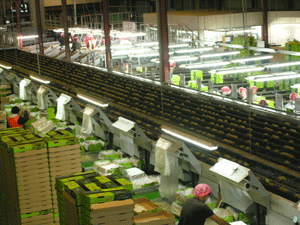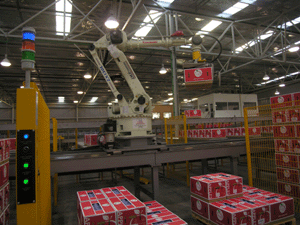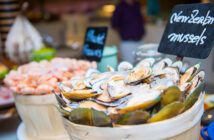By Les Watkins
Indonesia and its constantly growing population now nudging 140 million seemed set to become one of our major customers for products such as onions, apples and kiwifruit. Now political conflict in the country is threatening to sabotage a fast-expanding export market worth millions.
Things looked rosier than the apples until January when the Indonesian government announced regulations which could create immense and potentially damaging hurdles.
A key change – initially planned to be enforced this month but now in limbo – bans horticultural goods being imported through the country’s top trading area -Tanjun Priok Port at Jakarta.
For years Jakarta, the country’s capital and biggest city with a population of about 10 million, has been recognised by exporters as the most suitable entry gate.
A measure of its increasing importance is seen, for instance, in the 60 percent growth in fruit alone arriving there in one season. The period of January-October 2011 saw the value of worldwide fruit imports through Jakarta rise to US$344 million from US$214.7 million in the corresponding period the previous year.
In January it was the most important of the 14 gates for imported horticultural products – but then came the edict aimed at slashing the total number of gates to four.
The four are Jakarta’s international airport, Belawan seaport in Medan, Soekarno-Hatta seaport in Makassar and Tanjung Perak seaport in East Java.
If this edict is enforced – and the entire situation has now been confused by internal politics – New Zealand produce would have to be sent to the East Java port.
And that prospect, understandably, is creating immense concern for our exporters.
“To start with, it would involve much more travelling time,” says HortNZ chief executive Peter Silcock.
“With perishable products you want to get them as speedily as possible to the main population centres.”
Shipping them to the Tanjung Perak port would require them to be transported vast distances by train or truck and there would also be the additional risk of them being inadequately stored before or during such journeys.
“This could result in the loss of the product or, at the least part of it being significantly damaged,” says Mr Silcock.
“Indonesia is one of our fastest growing markets. It has doubled in size over the past two years and it has great potential.
“Onions are our major export to Indonesia – bringing in nearly NZ$9 million in 2010. The figure for apples was $5 million and that for kiwifruit was $4 million.”
The latest government decision has also brought a second cause for concern. The new regulations include tougher monitoring of fruit and vegetables at points of entry – to check for possible contamination by deadly chemicals, heavy metals, mycotoxins and micro-organisms such as E.colior salmonella.
Indonesia’s agriculture minister, Mr Suswono, says this move is designed to protect the local market from ‘garbage goods’.
“We do not want to see an influx of imported goods have a negative impact on local crops. Some of the imported products brought pests. It is dangerous,” he says.
“This again holds up the product,” says Mr Silcock.
“Getting the results might involve a wait of a couple of days and that, of course, increases the risk of the product deteriorating – particularly if it is not being looked after as it should.
“A few other countries do their own testing but not many. Most realise that here in New Zealand we have good safety and biosecurity systems.”
The new regulations, especially that involving the move from the Jakarta gate have been questioned by the New Zealand and US embassies in Indonesia. They have told the government there that it would hamper trade.
Now it seems the national government’s plans could now be stalled by the country’s political differences.
Last month the provincial government of East Java, which has jurisdiction over the Tanjung Perak port, rejected the idea of it becoming a major gate for horticultural products – fearing that would backlash on the livelihood of the area’s farmers.
This stand prodded the national government into indicating that it might delay the changes planned to come into effect on March 19.
“We are hoping that sanity will prevail,” says Mr Silcock.






























































































